Discover the Health Benefits of Honeysuckle
Top 9 Amazing Honeysuckle Benefits, Side Effects, And Uses
Honeysuckle
The coming summer atmosphere reminds you to prepare for a beneficial herbal garden. And honeysuckle is a plant that you should not ignore. This herb is often loved for its fragrance and beauty. But you need to notice this plant's incredible benefits to the health and treatment of diseases. So swipe down to check out the top 9 honeysuckle benefits now! This will ensure you get all the great things in the garden.
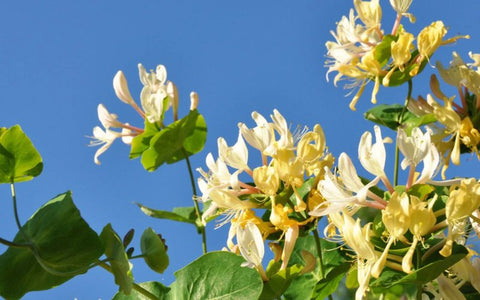
Top 9 Amazing Honeysuckle Benefits, Side Effects, And Uses
1. What is Honeysuckle, and what does it look like?
2. Top 9 Honeysuckle benefits for health and treatment
2.1 Cure digestive system diseases
2.2 Relieve cold symptoms
2.3 Reduce headaches
2.4 Support for the treatment of respiratory diseases
2.5 Maintain stable blood sugar
2.6 Reduce effects caused by bacteria and viruses
2.7 Good for oral cavity and throat
2.8 Benefit for skin and beauty
2.9 Reduce insomnia
3. How to use Honeysuckle to take advantage of it
4. Pay attention to the side effects of Honeysuckle
5. Conclusion
1. What is Honeysuckle, and what does it look like?
Honeysuckle, a term encompassing various species within the Caprifoliaceae family, is a versatile plant found mainly in the Northern Hemisphere, with over 175 known species. These plants can take the form of shrubs or vines. While shrub varieties can reach 20 to 30 feet, vine forms can grow between 30 and 80 feet tall. They produce trumpet-shaped flowers in various colors, emitting a distinct, sweet aroma that intensifies at night.
Two popular species, Lonicera japonica and Lonicera periclymenum, are widely used in traditional Chinese medicine for their various healing properties.
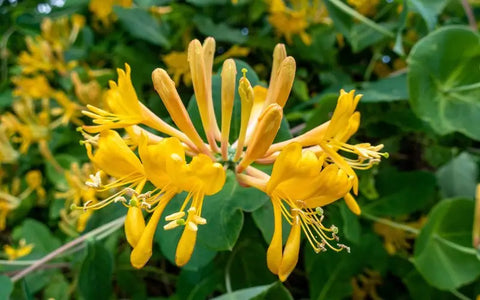
2. Top 9 Honeysuckle benefits for health and treatment
Honeysuckle has been employed as a natural remedy for inflammation, digestive issues, respiratory infections, and colds. In addition, it exhibits several other therapeutic benefits, such as blood sugar regulation, nausea relief, anti-inflammatory effects, and even hair health and anti-aging properties. Let's explore these benefits in more detail.
2.1 Cure digestive system diseases
Honeysuckle buds are particularly effective in addressing digestive problems and relieving persistent diarrhea, gastroenteritis, constipation, nausea, enteritis, and bloating.
2.2 Relieve cold symptoms
On the other hand, Honeysuckle tea serves as a valuable remedy for flu and common cold symptoms. When combined with honey, it can alleviate sore throats and headaches. The tea also helps regulate body temperature, making it useful during colds or hot summer days when cooling down is desired.
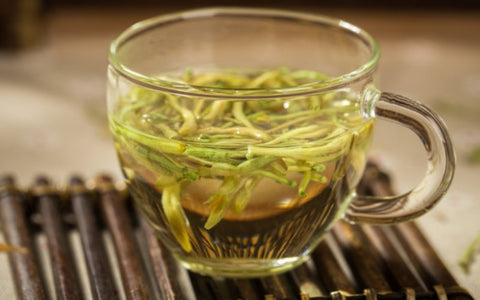
2.3 Reduce headaches
Honeysuckle possesses numerous anti-inflammatory and analgesic properties, making it an effective remedy for headaches. To alleviate head pain, steep two teaspoons of dried leaves or flowers in boiling water for 10 minutes and enjoy the tea.
2.4 Support for the treatment of respiratory diseases
In terms of respiratory health, honeysuckle can be employed to combat upper respiratory tract infections and asthma.
Significantly, studies on honeysuckle and Huangqi extracts have revealed their potential therapeutic impact on COVID-19, as they upregulate microRNAs like let-7a, miR-148b, and miR-146a, which help reduce SARS-CoV-2 pathogenesis. These herbs also inhibit inflammatory cytokines such as IL-6 and TNF-α, contributing to the cytokine storm in acute respiratory distress syndrome, a leading cause of COVID-19 deaths.
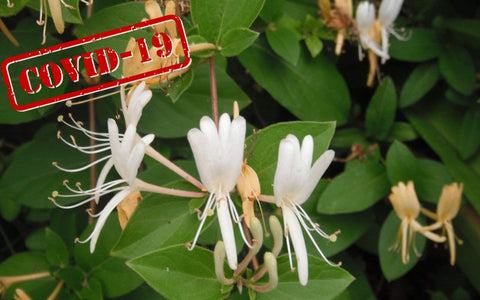
2.5 Maintain stable blood sugar
Maintaining balanced blood sugar is crucial for overall health; honeysuckle tea can aid in this process. By regulating glucose levels, this tea helps prevent symptoms associated with imbalanced blood sugar, such as blurring vision, increased fatigue, mood swings, hunger, headaches, thirst, sweating, and heart palpitations. Consuming a cup of this tea daily can serve as a protective measure against these issues.
2.6 Reduce effects caused by bacteria and viruses
When taken in suitable amounts, Honeysuckle can mitigate various health issues stemming from bacterial infections, including tuberculosis, streptococcus, and salmonella.
In a Cell Research journal study, researchers from Nanjing University discovered a plant microRNA in honeysuckle called MIR2911, which showed potential to block lethal influenza A viruses, such as H1N1 (swine flu) and H5N1 (avian influenza), during clinical trials.
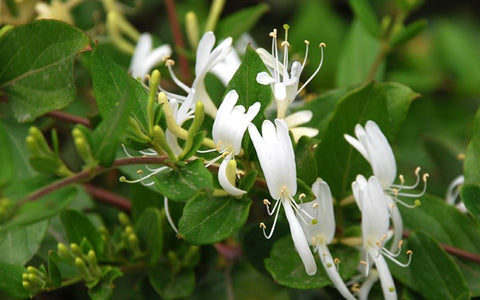
2.7 Good for oral cavity and throat
Honeysuckle's astringent qualities make it an excellent component for mouthwashes, delivering a soothing sensation and harnessing its antibacterial properties to aid in healing sore throats and other symptoms associated with colds or the flu.
2.8 Benefit for skin and beauty
According to Healthline, honeysuckle can also address skin conditions like poison oak rashes, cuts, and abrasions. However, some people might experience skin irritation from its use, and we need more research to prove its effects.
In addition, this plant can help tackle premature aging by diminishing the visibility of fine lines and wrinkles, leading to a more youthful appearance for both the face and body.
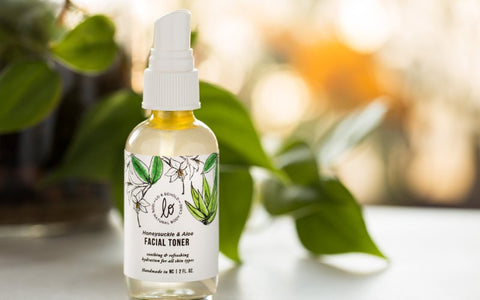
2.9 Reduce insomnia
Honeysuckle tea is known to be an effective herbal remedy for insomnia. Consuming it before bedtime can promote deeper sleep and improve overall sleep quality. Also, the sweet fragrance emitted by this plant can foster relaxation. This plant requires ample sunlight to thrive, so it's best to place it near a window.
3. How to use Honeysuckle to take advantage of it
You can get the most out of your honeysuckle benefits at home in many ways. Besides the main ingredient in this herb, you can combine it with other ingredients, depending on your needs and personal taste. However, paying attention to its dosage and side effects is essential.
Here are ways to use this plant:
Making tea: Let's dry the flowers of this plant and see the instructions here for how to make the tea. This herbal tea is helpful to improve sleep, beautify the skin, and aid in the treatment of colds/flu and some other ailments.
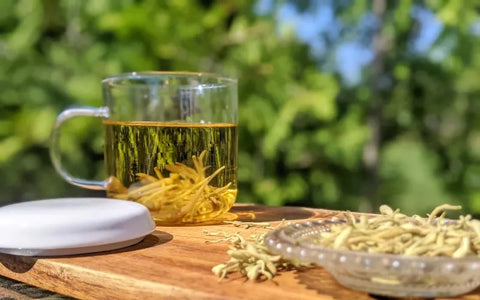
Essential oils: style="font-weight: 400;"> When applied topically, honeysuckle can soothe chapped or irritated skin. It can be incorporated into oils to create lip balms, skin oils, lotions, soaps, and body butter.

Alcohol: Japanese honeysuckle alcohol, often combined with an equal portion of chopped basil, is a valuable addition to natural remedy cabinets for its effectiveness against colds and viruses.

Want to know more ways to enjoy honeysuckle benefits? Check them out here!
4. Pay attention to the side effects of Honeysuckle
There are potential side effects to consider before using honeysuckle in any form:
- Bleeding disorders: Active ingredients of this plant may thin the blood, so those with bleeding disorders or upcoming surgery should avoid it.
- Pregnancy and breastfeeding: Due to the numerous active compounds in honeysuckle, pregnant and nursing women should abstain from its use.
- Berry toxicity: Most species' berries are poisonous and can lead to serious gastrointestinal side effects and other risks.

As with any herbal remedy, it is crucial to consult a doctor before incorporating it into your health and wellness routine.
5. Conclusion
In short, honeysuckle benefits are various. This herb is used in Chinese medicine remedies and many modern beauty products. It has anti-inflammatory effects, treats sore throat, reduces fever, supports the treatment of brain swelling, etc. Honeysuckle tea is also a great drink to improve sleep and fight aging. Visit TheRike and buy this herb to enjoy all the benefits mentioned above.





Leave a comment